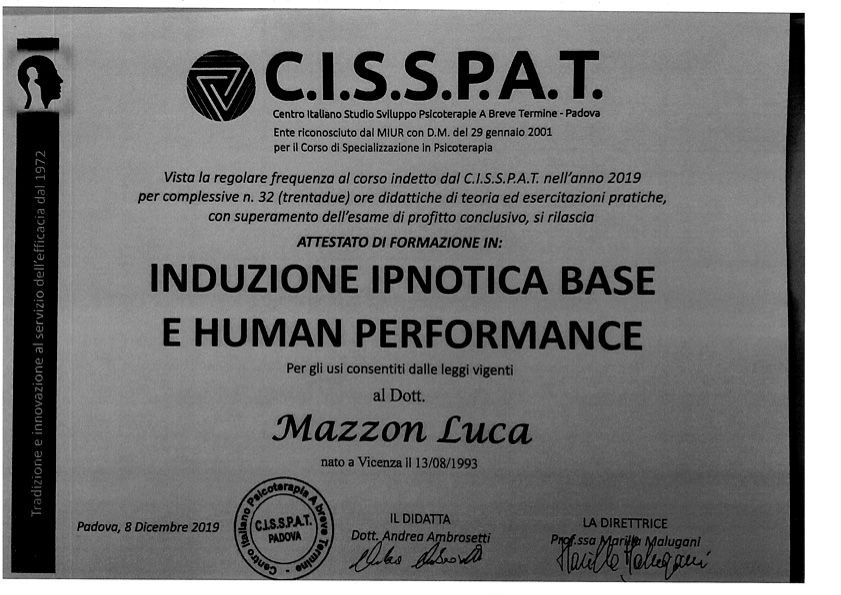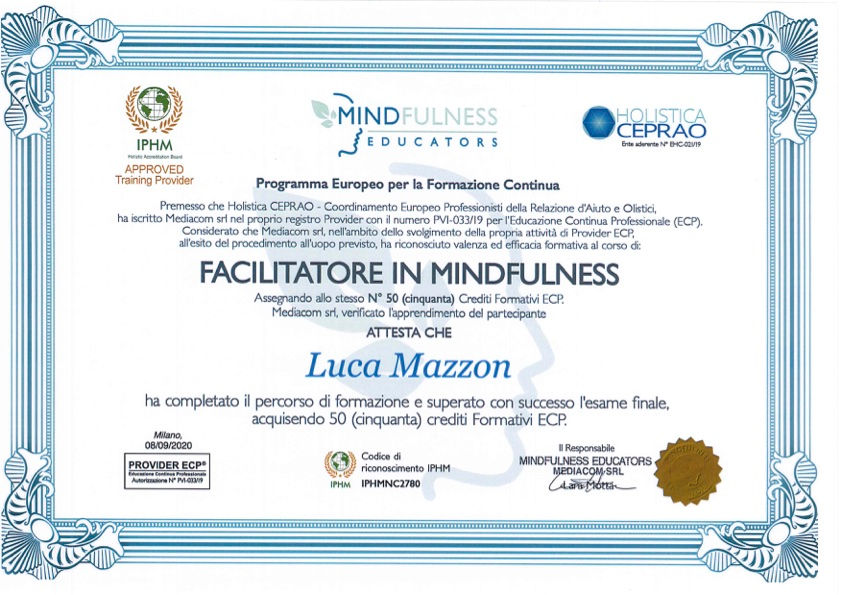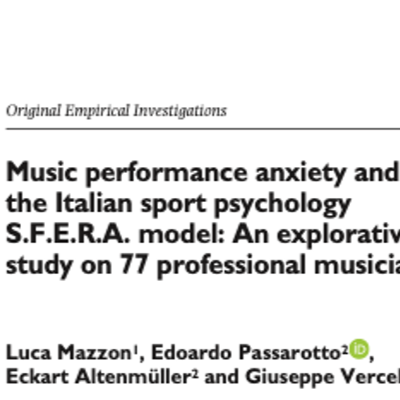

HYpnosis
Hypnosis is a state of deep concentration and relaxation where the mind becomes highly receptive to targeted suggestions. Contrary to popular belief, hypnosis does not involve losing control or consciousness but rather enhances focus and openness to explore new thought and behavioral patterns. Through hypnosis, the therapist guides the patient to change rigid mental models that negatively affect daily life.
Una grande passione...
Dopo un'importante formazione che mi ha personalmente cambiato la vita e aperto ad una grande passione per l'ipnosi presso il CISSPAT di Padova in ipnosi per le prestazioni, mi sono ulteriormente formato in ipnoterapia presso l'Istituto di Ipnosi clinica di Magdeburgo con l'innovativo approccio del Dr. Normbert Preetz che ha dimostrato una rapida efficacia e funzionalità nelle fobie e problematiche legate allo stress o blocchi emotivi.
Constructivist Hypnosis
Constructivist Hypnosis specifically builds on the idea that individuals actively construct their reality through personal experiences and beliefs. During a session, the patient is invited to explore new interpretations of their experiences and let go of mental patterns that may limit growth and well-being. This process takes place in a state of light or deep trance, depending on the therapeutic needs.
How it works
In a hypnosis session, the therapist induces a trance state through relaxation and focus techniques. In this state, the mind is more open to change and restructuring limiting beliefs. Hypnosis is a collaborative process in which the patient remains fully in control of their decisions.
Hypnosis is used to:
-
Overcome emotional blocks: Fear, anxiety, and trauma can be addressed directly, working on the unconscious patterns that fuel them.
-
Enhance performance: Athletes, artists, and professionals use hypnosis to boost concentration and overcome performance anxiety.
-
Manage stress: Restructuring perceptions helps to manage stress more effectively.
Effectiveness and Scientific Research
Numerous studies support hypnosis as a therapeutic intervention. Hammond (2010), in American Journal of Clinical Hypnosis, highlighted hypnosis as effective for treating anxiety, depression, and psychosomatic disorders. Another study by Jensen and Patterson (2014) showed hypnosis’ effectiveness in reducing chronic pain, improving patients' quality of life.
Hypnosis for Musicians and Athletes
Hypnosis has been proven to be a powerful tool for improving the performance of musicians and athletes. Pates and Maynard (2000) demonstrated that hypnosis can enhance concentration and reduce performance anxiety in athletes, increasing their effectiveness in high-pressure situations. Similarly, research by Gruzelier et al. (2014) showed that hypnosis helps musicians improve their performance quality by reducing stage fright.
not for everyone
Despite the numerous benefits, hypnosis might not be the optimal solution for everyone. Some individuals may require a different or integrated approach, such as cognitive-behavioral therapy (CBT) or other forms of counseling.
Bibliography
-
Hammond, D. C. (2010). Hypnosis in the treatment of anxiety- and stress-related disorders. American Journal of Clinical Hypnosis, 53(1), 27-49.
-
Jensen, M. P., & Patterson, D. R. (2014). Hypnotic approaches for chronic pain management: clinical implications of recent research findings. American Psychologist, 69(2), 167-177.
-
Pates, J., & Maynard, I. W. (2000). Effects of hypnosis on flow states and golf performance. Perceptual and Motor Skills, 91(3), 1057-1075.
-
Gruzelier, J. H., Egner, T., & Vernon, D. (2014). Validating the efficacy of neurofeedback for optimizing performance. Journal of Applied Psychophysiology and Biofeedback, 39(3-4), 231-241.

Get in Touch

certifications



















